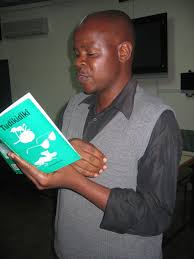
Title: Tudikidiki Author: Memory Chirere Publisher: Priority Projects Publishing (2015) ISBN: 978-0-7974-3401
REVIEWED BY BENIAH MUNENGWA
READING through the second edition of Memory Chirere’s anthology of “flash” Shona stories, Tudikidiki, I got immersed in the author’s easy flowing playful wit and poetic voice, which has become his trademark.
Tudikidiki, as the name suggests, is a collection of some very short and some not so very short stories that capture the worldview of the usually neglected voice — that of children, although some stories are narrated by adults, but adults showing their weaker side of being childish and vulnerable.
Although one might assume that the whole piece of work is supposed to be consumed by children alone, as Ignatius Mabasa strongly stresses in the preface, however, these are stories that can feed adult conscience.
When I was flipping through the pages, nostalgic memories of my childhood erupted in my mind as I identified with strands of what I went through in the communal lands growing up or what I heard of about the city or other characters.
The short stories are enveloped in layers that make them look innocent at face value. It is quite easy to assume that the writer is just talking about childhoods and their represented perspectives but a closer look makes it seem otherwise.
Take for instance, the story Nakai, Uri Kundiuraya! It explores the teacher-pupil relationship at a much deeper ideological level. Miss Chirara appears to draw immense pleasure just from hitting her pupils even for the most negligible acts.
- Chamisa under fire over US$120K donation
- Mavhunga puts DeMbare into Chibuku quarterfinals
- Pension funds bet on Cabora Bassa oilfields
- Councils defy govt fire tender directive
Keep Reading
However, one day all does not turn out well when she beats Nakai for dropping a ruler by mistake only to suffer at the disposal of Nakai’s spiritual protection. Then one day after reconciliation, Nakai’s spiritual powers help save her headmaster’s life after an accident occurs at the school.
The story might seem like a mundane school story, but it explores and sends out two messages. Firstly, that corporal punishment must be minimised and done to suit both parties and that spiritual powers can be of good effect and must be embraced for the betterment of humanity.
The story, Zvingwa Zviviri Zvine Nyama Pakati, explores the question of whether the sanctions imposed on Zimbabwe by the United State and other European countries at the behest of the British are driving Zimbabweans towards their fate or they have nothing at all to do with it. The same happens in Mari Inonzi Mari.
It is a satire on what money makes people do and how it can make their ego expansive. Hence, all in all, these are not stories limited to mere childhood nuisances.
Chirere cleverly manipulates the child’s voice and to deal with matters that could be rather sensitive and attract some backlash if explicitly confronted at the adult level. And laughter helps mask such explicitness.
Because of the simplicity of presentation of the short stories, easy reading typeface, simple diction, animation and humour, the anthology makes a good and timeless read. It is a collection that you can take on a road journey, a flight, a train trip or even a voyage into the sea and escape into other sorts of realities that you might have missed in your days of existence.
Chirere makes Shona come alive, decorated with legible high-flying humour that cracks one’s ribs, music, dance and the well-presented tactile and visual imagery that quenches the thirst for imagination soul-finding and mind-travelling.
As a writer, he encrypts his characters, engraving and protecting them from potential criticism by the readers. He owns and loves his characters and only he can make his characters speak. And for all their bad actions, they are automatically forgiven.
This can be seen in Kudondo kwaRuzande where Gabhu, a young soul, serenades his employers with a guitar robbed from his father whom he had killed. But Chirere does not take upon his writing prowess to slaughter this would be villain in our everyday life.
In every other situation, characters succumb to moments of weakness or stupidity. After all, why pass judgment?
And after enjoying the delicate meal for my eyes, offered and served by this anthology, in a language and cultural packaging not alien to me in anyway, I can safely say, because of the all-encompassing life experiences captured and explored in the anthology, any reader will not regret recommending the read to a friend, ex-lover or even anyone for in 23 juicy stories, one will definitely reconnect to a recent to a not so recent self.
For that reason and many more reasons that you shall unravel when you shall take the read yourself, I will keep my copy of Tudikidiki for my grandchildren if I will have any, of this piece from the time NAMA winning bi-lingual writer and poet.
lBeniah Munengwa can be contacted on [email protected]











